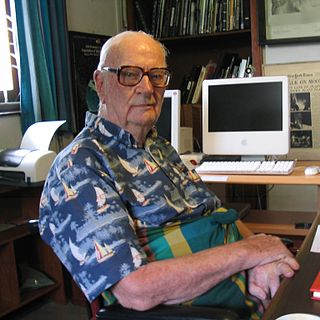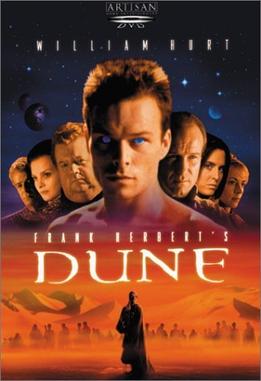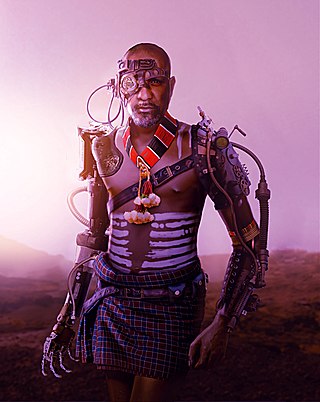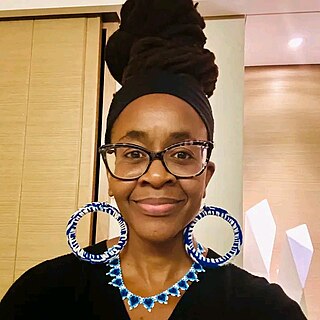Related Research Articles

Hard science fiction is a category of science fiction characterized by concern for scientific accuracy and logic. The term was first used in print in 1957 by P. Schuyler Miller in a review of John W. Campbell's Islands of Space in the November issue of Astounding Science Fiction. The complementary term soft science fiction, formed by analogy to the popular distinction between the "hard" (natural) and "soft" (social) sciences, first appeared in the late 1970s. Though there are examples generally considered as "hard" science fiction such as Isaac Asimov's Foundation series, built on mathematical sociology, science fiction critic Gary Westfahl argues that while neither term is part of a rigorous taxonomy, they are approximate ways of characterizing stories that reviewers and commentators have found useful.

Frank Herbert's Dune is a 2000 science fiction television miniseries, based on the 1965 novel of the same title by Frank Herbert. It is written for the screen and directed by John Harrison, and stars Alec Newman as Paul Atreides, William Hurt as Duke Leto Atreides, and Saskia Reeves as Lady Jessica, along with Ian McNeice, Julie Cox, and Giancarlo Giannini. It was an international co-production between the American cable network Syfy, and companies in Germany, Canada, and Italy. This is the second overall filmed adaptation of Herbert’s novel, following the 1984 film directed by David Lynch, and preceding Denis Villeneuve’s two-part film adaptation.

Afrofuturism is a cultural aesthetic, philosophy of science, and history that explores the intersection of the African diaspora culture with science and technology. It addresses themes and concerns of the African diaspora through technoculture and speculative fiction, encompassing a range of media and artists with a shared interest in envisioning black futures that stem from Afro-diasporic experiences. While Afrofuturism is most commonly associated with science fiction, it can also encompass other speculative genres such as fantasy, alternate history and magic realism. The term was coined by American cultural critic Mark Dery in 1993 and explored in the late 1990s through conversations led by Alondra Nelson.

Nnedimma Nkemdili "Nnedi" Okorafor is a Nigerian American writer of science fiction and fantasy for both children and adults. She is best known for her Binti Series and her novels Who Fears Death, Zahrah the Windseeker, Akata Witch, Akata Warrior, Lagoon and Remote Control. She has also written for comics and film.

Mundane science fiction (MSF) is a niche literary movement within science fiction that developed in the early 2000s, with principles codified by the "Mundane Manifesto" in 2004, signed by author Geoff Ryman and "The Clarion West 2004 Class". The movement proposes "mundane science fiction" as its own subgenre of science fiction, typically characterized by its setting on Earth or within the Solar System; a lack of interstellar travel, intergalactic travel or human contact with extraterrestrials; and a believable use of technology and science as it exists at the time the story is written or a plausible extension of existing technology. There is debate over the boundaries of MSF and over which works can be considered canonical. Rudy Rucker has noted MSF's similarities to hard science fiction and Ritch Calvin has pointed out MSF's similarities to cyberpunk. Some commentators have identified science fiction films and television series which embody the MSF ethos of near-future realism.

Black science fiction or black speculative fiction is an umbrella term that covers a variety of activities within the science fiction, fantasy, and horror genres where people of the African diaspora take part or are depicted. Some of its defining characteristics include a critique of the social structures leading to black oppression paired with an investment in social change. Black science fiction is "fed by technology but not led by it." This means that black science fiction often explores with human engagement with technology instead of technology as an innate good.
The Comet is a science fiction short story, written by W. E. B. Du Bois in 1920. It discusses the relationship between Jim Davis and Julia after a comet hits New York and unleashes toxic gases that kill everyone in New York except them.

Maurice Broaddus is an American author who has published fiction across a number of genres including young adult, horror, fantasy and science fiction. Among his books are The Knights of Breton Court urban fantasy trilogy from Angry Robot, the steampunk novel Pimp My Airship from Apex Publications, and the young adult novel The Usual Suspects from HarperCollins. His Afrofuturist space trilogy Astra Black will be released by Tor Books beginning in March, 2022. He has also published dozens of short stories in magazines such as Asimov's Science Fiction, Black Static, Fantasy & Science Fiction, and Weird Tales along with anthologies including Black Panther: Tales of Wakanda, The Year's Best Science Fiction & Fantasy and Sunspot Jungle.

Annihilation is a 2018 science fiction horror thriller film written and directed by Alex Garland, loosely based on the 2014 novel of the same name by Jeff VanderMeer. It stars Natalie Portman, Jennifer Jason Leigh, Gina Rodriguez, Tessa Thompson, Tuva Novotny, and Oscar Isaac. The story follows a group of scientists who enter "The Shimmer", a mysterious quarantined zone of mutating plants and animals caused by an alien presence.
Hannah Beachler is an American production designer. The first African-American to win the Academy Award for Best Production Design, she is known for her Afrofuturist design direction of Marvel Studios film series Black Panther and Black Panther: Wakanda Forever. Beachler has been involved in numerous projects directed by Beyoncé, including Lemonade and Black Is King.
Gqom, gqom tech or sghubu), is an electronic dance music genre and subgenre of house music that emerged in the early 2010s from Durban, South Africa, pioneered largely by music producers Naked Boyz, Sbucardo, DJ Lag, Rudeboyz, Nasty Boyz, Griffit Vigo, Distruction Boyz, Menzi Shabane and Citizen Boy. It was developed from kwaito, a subgenre of house from South Africa.

M. Asli Dukan is an American independent media producer, filmmaker and visual artist based in Philadelphia working with themes of speculative fiction and Afrofuturism.
Jenn Nkiru is a Nigerian-British artist and director. She is known for directing the music video for Beyoncé's "Brown Skin Girl" and for being the second unit director of Ricky Saiz’s video for Beyoncé and Jay-Z, "APESHIT" which was released in 2018. She was selected to participate in the 2019 Whitney Biennial.

Tochi Onyebuchi is an American science fiction and fantasy writer and former civil rights lawyer. His 2020 novella, Riot Baby, received an Alex Award from the American Library Association and the World Fantasy Award in 2021. He is known for incorporating civil rights and Afrofuturism into his stories and novels.

Iwájú is an animated science-fiction miniseries produced by Walt Disney Animation Studios and the Pan-African British-based entertainment company Kugali Media for the streaming service Disney+. It was written by Olufikayo Adeola and Halima Hudson from a story by Adeola, Hamid Ibrahim, and Toluwalakin Olowofoyeku and directed by Adeola, and is the first "original long-form animated series" produced by Walt Disney Animation Studios. The title of the series, iwájú, roughly translates to "the future" in the Yoruba language.
Africanfuturism is a cultural aesthetic and philosophy of science that centers on the fusion of African culture, history, mythology, point of view, with technology based in Africa and not limiting to the diaspora. It was coined by Nigerian American writer Nnedi Okorafor in 2019 in a blog post as a single word. Nnedi Okorafor defines Africanfuturism as a sub-category of science fiction that is "directly rooted in African culture, history, mythology and point-of-view..and...does not privilege or center the West," is centered with optimistic "visions in the future," and is written by "people of African descent" while rooted in the African continent. As such its center is African, often does extend upon the continent of Africa, and includes the Black diaspora, including fantasy that is set in the future, making a narrative "more science fiction than fantasy" and typically has mystical elements. It is different from Afrofuturism, which focuses mainly on the African diaspora, particularly the United States. Works of Africanfuturism include science fiction, fantasy, alternate history, horror and magic realism.
Kizazi Moto: Generation Fire is an Afrofuturist and Africanfuturist animated anthology short film series produced by Triggerfish. It premiered on July 5, 2023, on Disney+. It received generally positive reviews from critics.
References
- 1 2 3 4 5 6 Clark, Ashley (April 2, 2015). "Afrofuturism on film: five of the best". The Guardian . Retrieved January 17, 2018.
- 1 2 3 4 Kenny, Glenn (March 13, 2018). "Exploring Afrofuturism in Film, Where Sci-Fi and Mythology Blur". The New York Times . Retrieved March 13, 2018.
- ↑ Contreras, Russell (February 14, 2021). "Afrofuturism: The rise of Black science fiction and fantasy". Axios . Retrieved March 4, 2021.
- 1 2 3 4 5 6 7 8 9 10 Clark, Ashley (April 11, 2015). "Afrofuturist Film From Around the World At BAMcinématek, Brooklyn". indiewire.com. IndieWire . Retrieved January 17, 2018.
- 1 2 3 4 5 6 7 8 Bashir, Zubaydah (May 23, 2018). "Here's Our List of 8 Must-See Afrofuturist Films". OkayAfrica . Retrieved August 30, 2018.
- 1 2 3 4 5 6 7 8 9 10 11 12 13 14 15 16 17 18 19 20 Strait, Kevin M.; Conwill, Kinshasha Holman, eds. (2024). "Further Viewing". Afrofuturism: A History of Black Futures. Smithsonian Books. p. 206. ISBN 978-1-58834-771-8.
- ↑ Hoad, Phil (July 19, 2021). "Air Conditioner review – tech begins to fail in enigmatic Angolan Afrofuturism". The Guardian . Retrieved December 8, 2022.
- ↑ Brooks, Kinitra A. (August 4, 2020). "Opinion: With 'Black Is King,' Beyoncé has gone all in on Black. And Beyoncé doesn't lose". The Washington Post .
- 1 2 Harding, Xavier (November 12, 2017). "'Black Panther' isn't just another Marvel movie — it's a vision of a future led by blackness". Mic.com. Mic . Retrieved January 17, 2018.
- 1 2 3 4 5 6 7 Wade, Natalie (March 1, 2019). "Afrofuturism: Sci-Fi and Fantasy Culture for Black Artists". 14East. Retrieved March 15, 2019.
- 1 2 3 4 5 6 7 8 9 10 11 12 13 Ibrahim, Anifowoshe (September 18, 2020). "Explore Afrofuturism With These 13 Must-Watch Afrofuturist Movies". The Portalist. Open Road Integrated Media . Retrieved October 31, 2020.
- ↑ Chambliss, Julian C. (November 11, 2022). "'Black Panther: Wakanda Forever' continues the series' quest to recover and celebrate lost cultures" . Retrieved December 8, 2022.
- 1 2 3 4 5 6 7 Polacek, Jeremy (April 10, 2015). "The Fantastical Paradoxes of Afrofuturist Film". Hyperallergic . Retrieved January 17, 2018.
- 1 2 Glasner, Eli (February 10, 2018). "'We are ready. We've been ready': Black Panther ushers in a new wave of black sci-fi". CBC.ca . Retrieved February 18, 2018.
- ↑ Davis, Jonita (April 24, 2020). "How Black Women Are Reshaping Afrofuturism". Yes! . Retrieved July 17, 2020.
- ↑ The Rocket, Stubby (January 16, 2018). "How Hello, Rain Builds on the Magic of Nnedi Okorafor's "Hello, Moto"". tor.com. Tor.com . Retrieved January 16, 2018.
- ↑ Moussavi, Cyrus. "I Snuck Off The Slave Ship". cyrusmoussavi.com. Retrieved May 29, 2024.
- 1 2 3 4 5 6 Clark, Ashley (February 22, 2018). "What to Watch After Black Panther: An Afrofuturism Primer". Vulture . Retrieved April 22, 2018.
- ↑ Polo, Susana (January 26, 2018). "Black Panther, explained". Polygon . Retrieved January 28, 2018.
- ↑ "Films". ytashawomack.com. Retrieved May 29, 2024.
- 1 2 3 Sylvans, Winston (July 13, 2017). "What Is Afrofuturism? Three Movies To Watch If You Want To Get Familiar". konbini.com. Retrieved January 17, 2018.
- ↑ Isama, Antoinette (July 21, 2018). "A Sci-Fi Film About an Otherworldly Village Made of Old Computer Parts In Burundi By Saul Williams Is In The Works". OkayAfrica. Retrieved November 11, 2018.
- ↑ Baumgarten, Marjorie (February 24, 2006). "Les Saignantes". The Austin Chronicle . Retrieved May 29, 2024.
- ↑ Finley, Taryn (May 20, 2019). "'See You Yesterday' Uses Time Travel To Remind Us Black Lives Still Matter". The Huffington Post . Retrieved December 31, 2020.
- ↑ Bruce, Delan (September 3, 2020). "Afrofuturism: From the Past to the Living Present". UCLA Newsroom. University of California, Los Angeles . Retrieved February 5, 2022.
- ↑ Cornall, Flo (June 27, 2023). "'Kizazi Moto: Generation Fire' brings Afro-futurism to Disney+". cnn.com. CNN . Retrieved June 1, 2024.